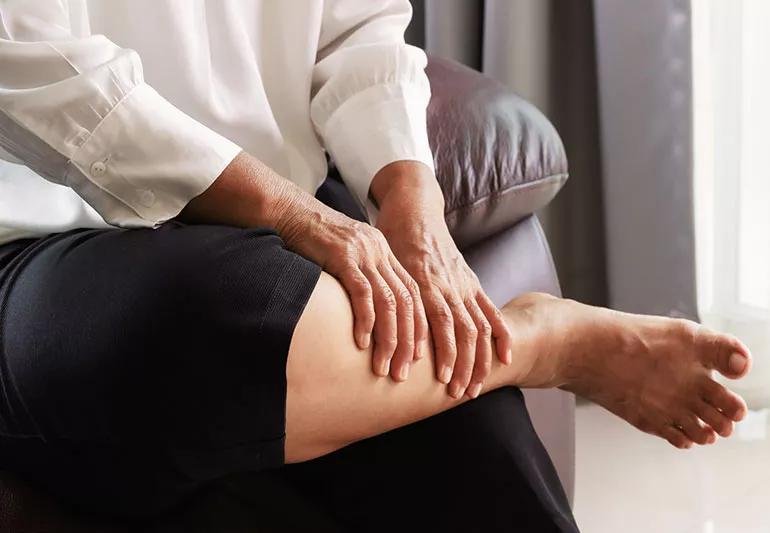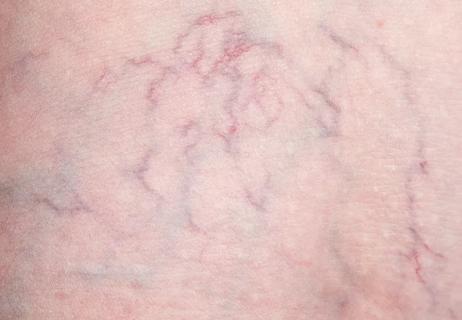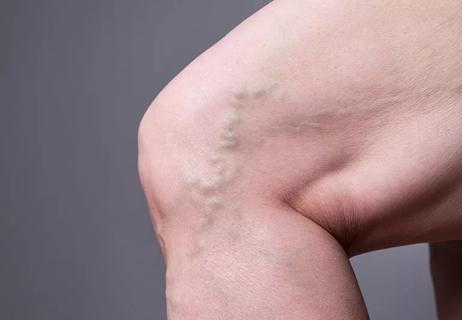It could be your feet need a rest, but swollen legs may also be a sign of a serious condition

Your legs are looking like they belong to the Stay Puft Marshmallow Man. You look down and can barely see your toes. And, wouldn’t you know, you suddenly have cankles (calf-ankles) where your ankles used to be.
Advertisement
Cleveland Clinic is a non-profit academic medical center. Advertising on our site helps support our mission. We do not endorse non-Cleveland Clinic products or services. Policy
“Why are my legs so swollen?” you ask.
It’s a good question — and not an easy one to answer.
“A hundred different things can cause swollen legs,” says vascular surgeon Francis Caputo, MD. And those can range from no big deal to very serious.
When should you be concerned? We talked to Dr. Caputo for the rundown on some common causes of leg swelling, and what to do about them.
If you find it difficult to put on or take off your shoes or socks, it could be a hint that something is amiss. Or if you find that it’s more difficult than usual to bend at your ankles, swelling may be the culprit.
“If you press gently on your lower leg and can see your fingerprint indent for more than a few seconds, chances are, you have some excess fluid buildup,” Dr. Caputo says.
Other signs of swollen legs may include:
Swollen legs can stem from a wide range of causes, Dr. Caputo reiterates. Sometimes, it’s a result of fluid buildup after a long day on your feet. In other cases, leg swelling can be a sign of a serious condition.
If you’ve been on your feet all day, it’s not uncommon to have some puffiness in your feet or legs. Same if you’ve been sitting for hours in a car or on a plane. That swelling, called edema, strikes when fluid builds up in your feet and legs. It’s more common in people who are overweight or pregnant but can happen to anyone.
Advertisement
What to do about it: Limit salt in your diet. When you’re traveling, get up frequently to stretch and move. If you have mild swelling and want to de-puff, go for a walk, do some ankle rolls or prop your feet up on pillows.
Deep vein thrombosis (DVT) is a blood clot that forms in a vein of your body, usually (but not always) in your pelvis, thigh or lower leg. Typical symptoms of DVT include:
DVT isn’t life-threatening itself. However, if a clot breaks free, it can travel to your lungs and block the flow of blood. That can lead to a pulmonary embolism — a very serious situation.
What to do about it: If you experience signs of DVT, it’s important to seek treatment right away to lessen your risk of pulmonary embolism. Your healthcare provider may recommend:
Sometimes, the veins in your legs can become weakened. When that happens, blood doesn’t flow as easily back to your heart. As a result, you can develop varicose veins and fluid buildup in your legs. Venous insufficiency sometimes develops in people who’ve had DVT in the past.
What to do about it: If you’re living with venous insufficiency, your healthcare provider may recommend:
Lymphedema occurs when your body’s lymph nodes aren’t filtering lymph fluid as well as they should. When that happens, it can cause swelling of one or more limbs, ranging from mild to dramatic.
Lymphedema sometimes occurs in people who’ve had lymph nodes removed for cancer treatment. It can affect others whose lymph nodes are damaged or working improperly for other reasons.
What to do about it: Common treatments for managing lymphedema include:
When your organs aren’t working as well as they should, fluid can build up in your legs. Congestive heart failure, kidney disease and liver disease can all cause swelling in your legs.
What to do about it: If you have (or suspect you have) any of these conditions and notice new or persistent swelling in your legs, talk to a healthcare provider about managing those conditions.
Advertisement
Plenty of other conditions can also make legs swell, including infections, injuries and conditions like arthritis. If the puffiness isn’t too dramatic and resolves within a day or so, it’s probably nothing to lose sleep over. Talk with a healthcare provider, though, if your swelling:
“Swollen legs are often a sign of a bigger problem,” states Dr. Caputo. “If you have leg swelling, you should get checked out by your primary care doctor to figure out what’s going on.”
Advertisement

Sign up for our Health Essentials emails for expert guidance on nutrition, fitness, sleep, skin care and more.
Learn more about our editorial process.
Advertisement

At-home treatments and lifestyle changes may help ease the symptoms and improve the appearance of varicose veins — but they aren’t a cure

Regular exercise, an iron-rich diet, adequate sleep and bedtime routines that include a warm bath or massage may help with your kid’s RLS

Unlike varicose veins, spider veins don't necessarily indicate poor circulation

Cardio can reduce the appearance of varicose veins, but only temporarily

Some symptoms should be taken seriously

Pain may signal a damaged nerve or herniated disk

Strategies for getting the sleep you need

The short answer from an interventional cardiologist

The tropical fruit is a good source of antioxidants and vitamin C

Most people fall asleep within 10 to 20 minutes, but if your experience is different, adjusting your sleep schedule may help

Exploring your hidden side can lead to better understanding of what makes you tick